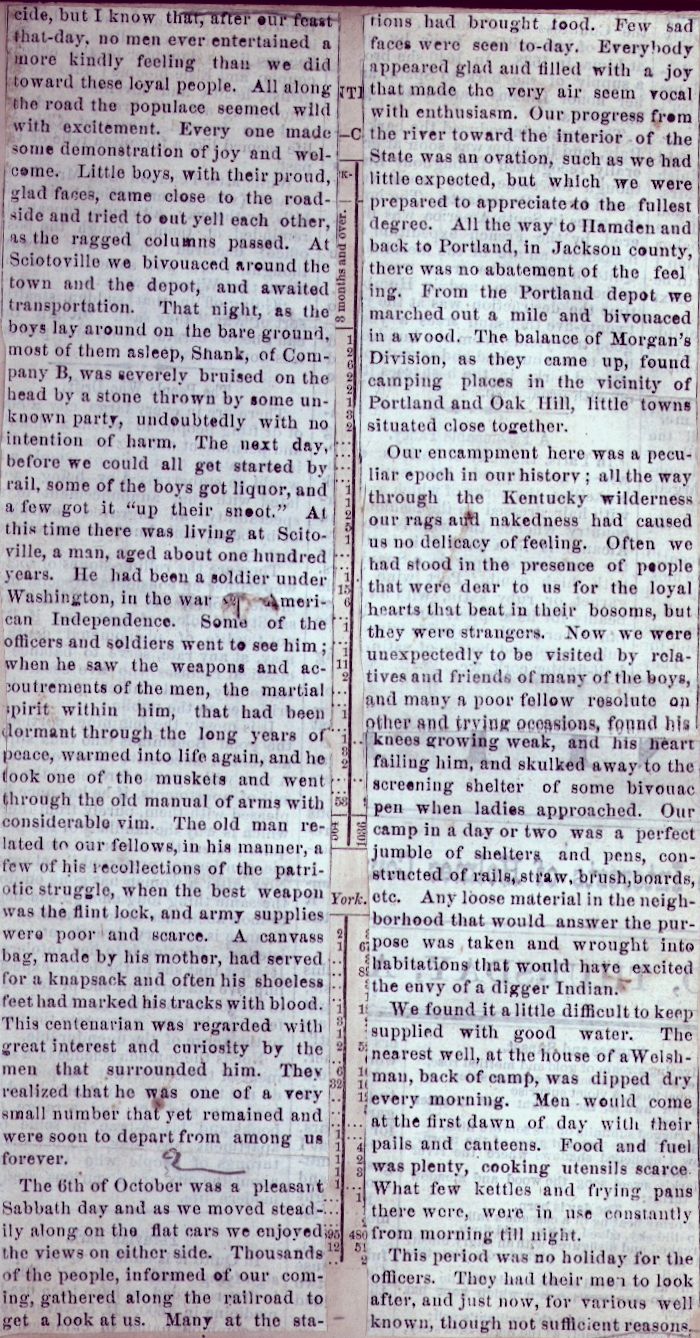| Camp & Field Page 40 | Camp & Field Index Page | 16th OVI Home Page | Camp & Field Page 42 |
The Camp & FieldArticles by Theodore Wolbach |
 Cpl. Theodore D. Wolbach |
The following image is taken from a book titled "Mortality and Statistics of the Census of 1850" in which it is believed retired Captain Rezin H. Vorhes, Company H, pasted over the pages a series of articles written by Cpl. Theodore D. Wolbach, Company E, titled "Camp and Field" and published, by chapter, in the Holmes County (Ohio) Republican newspaper from February 24, 1881 to August 17, 1882. The articles tell the story, in great detail and color, of the 16th OVI, from the inception of the 3-year regiment in October, 1861, through all its camps, battles and marches until it was disbanded on October 31, 1864. The articles pasted in the Vorhes book cover the first 35 chapters, published through October 20, 1881. All the remaining chapters were recently found in a Holmes County library by researcher Rob Garber who obtained copies, performed the transcriptions and provided to this website and which are also presented here, thus providing the complete work by Theodore Wolbach.
Throughout these articles click on the underlined white text for additional details.
The webauthor thanks 16th Ohio descendant Rob Garber for his excellent research on the Camp And Field articles and for performing the tedious digital transcription of those articles found on each page. The transcriptions were made to reflect the original articles verbatim, misspellings and all. Rob is the 3rd great nephew of Capt. William Buchanan, Company F, 16th Ohio, who served in the 90-day regiment as a private, re-enlisting in the three year regiment, and eventually making the rank of Captain of Company F. Thanks Rob!
Page 41 - Chapter 26 - October, 1862
 |
cide, but I know that, after our feast that day, no men ever entertained a more kindly feeling than we did toward these loyal people. All along the road the populace seemed wild with excitement. Every one made some demonstration of joy and welcome. Little boys, with their proud, glad faces, came close to the roadside and tried to out yell each other, as the ragged columns passed. At Sciotoville we bivouacked around the town and the depot, and awaited transportation. That night, as the boys lay around on the bare ground, Shank, of Company B, was severely bruised on the head by a stone thrown by some unknown party, undoubtedly with no intention of harm. The next day, before we could all get started by rail, some of the boys got liquor, and a few got it The 6th of October was a pleasant Sabbath day and as we moved steadily along on the flat cars we enjoyed the views on either side. Thousands of the people, informed of our coming, gathered along the railroad to get a look at us. Many at the sta- |
tions had brought food. Few sad faces were seen to-day. Everybody appeared glad and filled with a joy that made the very air seem vocal with enthusiasm. Our progress from the river toward the interior of the State was an ovation, such as we had little expected, but which we were prepared to appreciate to the fullest degree. All the way to Hamden and back to Portland, in Jackson county, there was no abatement of the feeling. From the Portland depot we marched out a mile and bivouaced in a wood. The balance of Morgan's Division, as they came up, found camping places in the vicinity of Portland and Oak Hill, little towns situated close together. Our encampment here was a peculiar epoch in our history; all the way through the Kentucky wilderness our rags and nakedness had caused us no delicacy of feeling. Often we had stood in the presence of people that were dear to us for the loyal hearts that beat in their bosoms, but they were strangers. Now we were unexpectedly to be visited by relatives and friends of many of the boys, and many a poor fellow resolute on other and trying occasions, found his knees growing weak, and his heart failing him, and skulked away to the screening shelter of some bivouac pen when ladies approached. Our camp in a day or two was a perfect jumble of shelters and pens, constructed of rails, straw, brush, boards, etc. Any loose material in the neighborhood that would answer the purpose was taken and wrought into habitations that would have excited the envy of a digger Indian. We found it a little difficult to keep supplied with good water. The nearest well, at the house of a Welshman, back of camp, was dipped dry every morning. Men would come at the first dawn of day with their pails and canteens. Food and fuel was plenty, cooking utensils scarce. What few kettles and frying pans there were, were in use constantly from morning till night. This period was no holiday for the officers. They had their men to look after, and just now, for various well known, though not sufficient reasons, |
| Camp & Field Page 40 | Camp & Field Index Page | 16th OVI Home Page | Camp & Field Page 42 |